
Corpus Christi
Join us for a special Sung Eucharist at 6.00pm on Thursday 16th June, followed by a fish & chip supper. To pre-order your supper, please sign up in church.

Join us for a special Sung Eucharist at 6.00pm on Thursday 16th June, followed by a fish & chip supper. To pre-order your supper, please sign up in church.
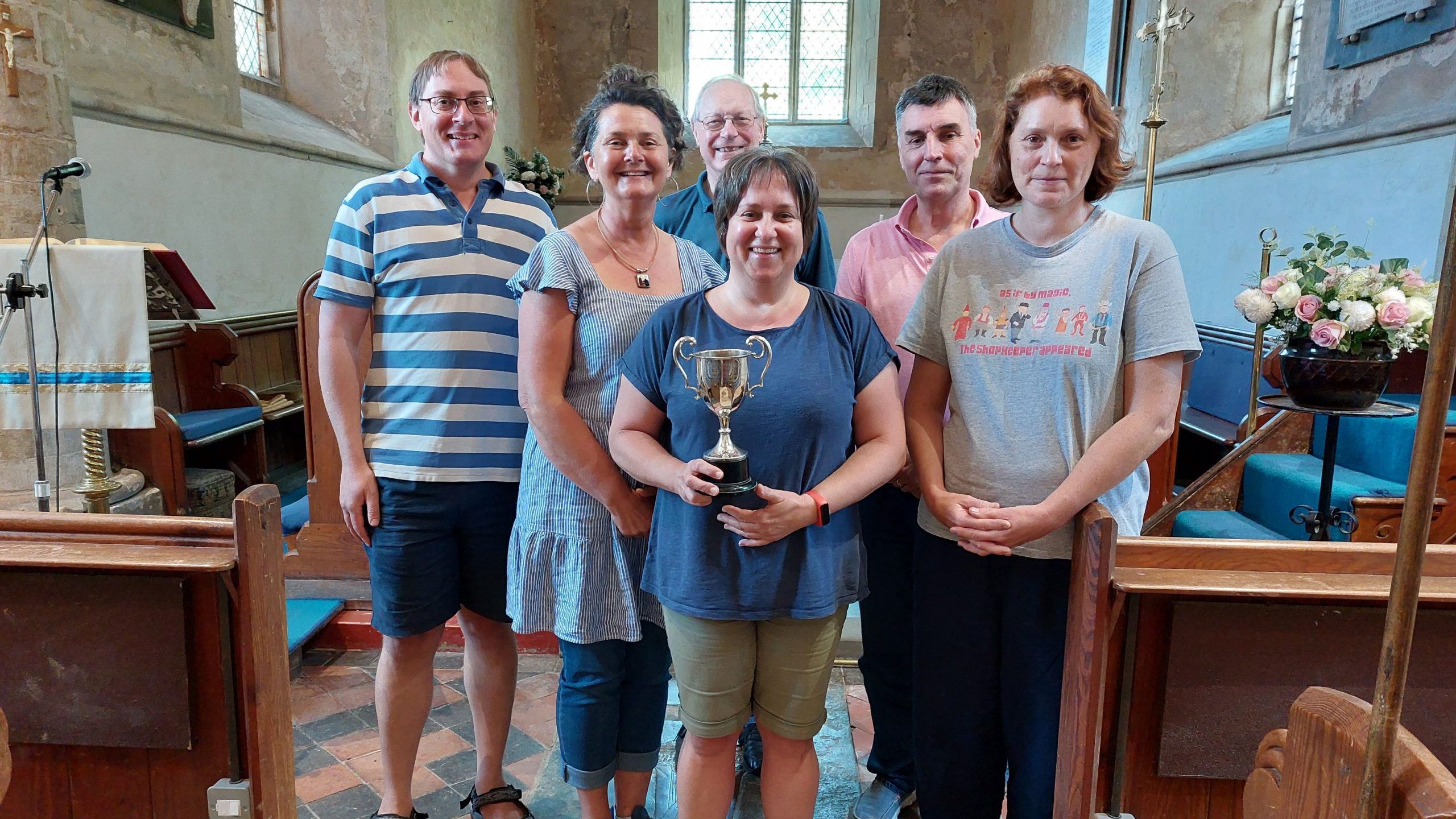
The Canterbury District Striking Competition which took place at Monkton Church on Saturday 14th May 2022 (The first one since 2019 due to ravages of the pandemic). 7 teams entered and the St Stephen’s Sunday Quarter Peal Band won, just pipping our friendly neighbours (St Dunstan’s Church) by 2.50 points.
Whilst called the Canterbury District, it is not just the immediate Canterbury area. This Bellringing District stretches as far as Lynsted and Teynham, Lyminge, Dover, Whitstable and the whole Thanet area.
One of the rules of the competition is that entrants must be regular Sunday service ringers. St Stephen’s Band consisted of ringers from other towers who help Jane ring for a Sunday service each Sunday by ringing a quarter peal either Sunday morning one week and Sunday evening another week. Without their help the faithful would not be called to service, there would be no public announcement that the church is there and open for worship, the bells would be silent. The observant may recognise the Presenter of the cup as Elizabeth, Don and Ruth Nibletts daughter who learnt to ring at St Stephen’s many years ago. Elizabeth and her husband were the judges – but they do not know the teams until the end of the competition as the judges are hidden away and out of sight.
Congratulations to them all!
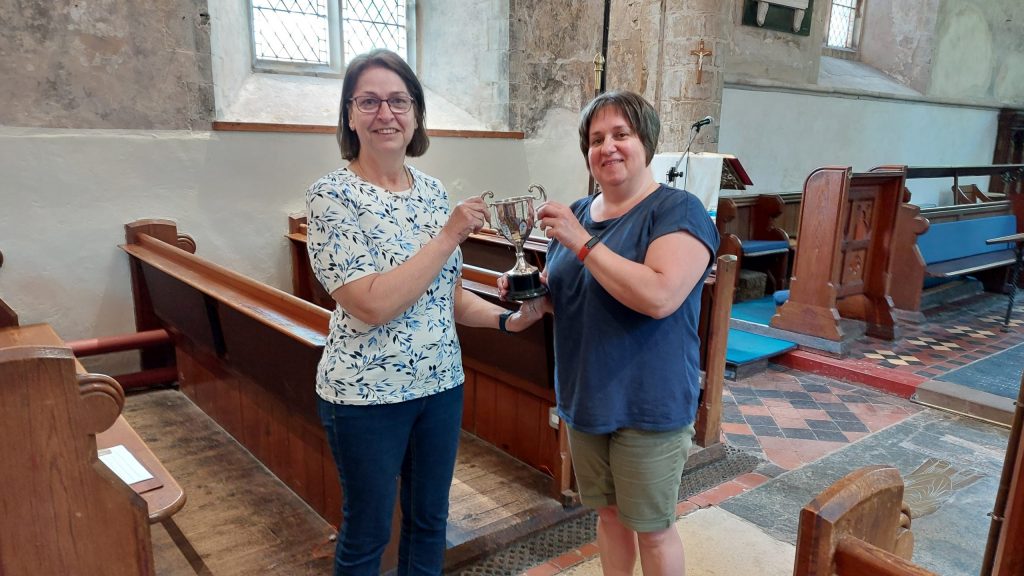

Steven Moore has thrust himself into the world of solo percussion over the last few years, receiving praise from audiences throughout the UK. Determined to succeed, he returned to the academic world, completing his bachelor’s and Master’s degree with distinction. He has now began work to complete his PhD, researching Marimba performance. Continuously developing his performance skills, Steven has received tutelage from Jason Huxtable, Pius Cheung and Dame Evelyn Glennie. As a soloist, he has collaborated with solo artists and performed concerto’s with various orchestras across the north east. Following success in previous years, 2022 will see recital tours across Scotland and the UK. Check out the ‘concert’ section for details or ‘contact’ if you require details about booking a performance.
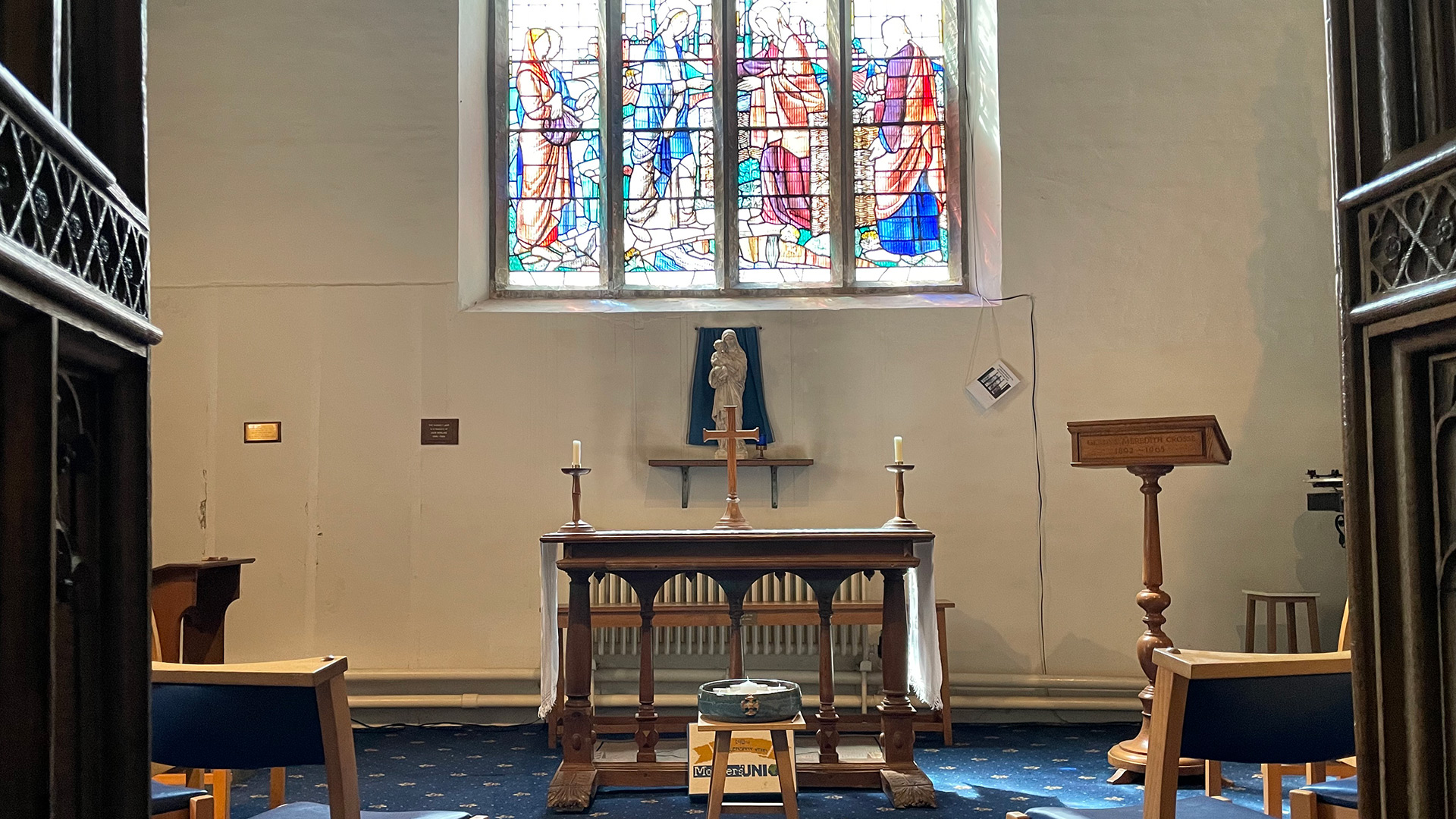
As part of our gradual and careful return to normal, we will be restarting our mid-week 10.15am Communion service and the Acorn Café from Wednesday 25th August. Do join us if you’d like to.
27th June 2020
The number of new cases and deaths from Covid 19 reported each day has fallen in recent weeks and so things are gradually “returning to normal”. In fact the figures are far from negligible – we still had more than a thousand new cases every day and 186 deaths on 26th June. Our figures are higher than any other European country except Sweden. Nevertheless non-essential shops were allowed to reopen last week, and it looks as if pubs and restaurants may follow suit shortly. Children are gradually returning to school and more people are returning to work.
In most situations this is a rather new normal, quite different from how things were before last February. Our local garden centre has introduced a one way system and a complicated but highly effective way of paying for what you have bought without anyone coming within 2 metres of anyone else. Other big shops seem to have taken similar measures. The bike shop is only open by appointment, made by email or phone; when we rang the vet about our dog’s sticky eye they asked us to email photos of it to them, and when I had a blood test last week I had to wait outside until they were ready to see me. Fine in June but it won’t be such fun in November.
So long as this easing of the lockdown doesn’t lead to the dreaded “second wave” this is generally seen as a good thing. And in some ways it is, although when I heard that “non-essential” shops were to be allowed to re-open I couldn’t help wondering why, if we could do without them for three months, they were open in the first place? Clearly there are some things like clothes (and bicycle tyres) which you can manage without buying for a few months but do need eventually, but I do wonder whether lockdown has revealed how little of what we spend our time and money on really matters. ” Getting and spending we lay waste our powers” as Wordsworth remarked.
The same applies to many other “normal” activities. When I hear airline bosses lamenting at the harm travel restrictions are doing to their business I want to cheer. The disruption to people’s lives when airlines and travel firms fail or cut back is of course sad, but on the whole the world is a better and a cleaner place for us spending less time (and carbon) rushing about it.
I suspect some of this is going to be permanent – businesses will realise that the benefits of sending people half way round the world for meetings rather than sorting things out on Zoom are not worth the bills for hotels and travel, or the time lost hanging about in airports.
The epidemic provides an opportunity for a rethink on how we organise our lives, towards less frenetic activity and more focus on leisure, relationships and contemplation. Pope Francis has spoken about this; he said recently:
Today I believe we have to slow down our rate of production and consumption and to learn to understand and contemplate the natural world. We need to reconnect with our real surroundings. This is the opportunity for conversion.
I see early signs of an economy that is more human. But let us not lose our memory once all this is past, let us not file it away and go back to where we were. This is the time to take the decisive step, to move from using and misusing nature to contemplating it. We have lost the contemplative dimension; we have to get it back.
The great thinker E F Schumacher realised this in the 1970’s and started to think through how it might work in his important books “Small is beautiful: economics as if people mattered” and “Good Work”. Schumacher was no starry-eyed idealist – he had trained as an economist and in the 1950’s he helped run the National Coal Board to fuel Britain’s post-war economy. But he realised that making money is a means to the good life, not an end in itself.
Sadly I rather doubt that our politicians have this vision – certainly not those currently in Government, who seem to be balancing controlling risk against the chance to make money in a way which prioritises the latter. One can only hope that those of us who have enjoyed the quieter streets, the chance to enjoy the birdsong and the trees, the home-made bread and banana cake will be able to hold on to those good things in the coming months.
I am not convinced that this is the end – not even that as Churchill put it the end of the beginning. Having dithered far too long in taking the necessary measures in January, February and March, we now seem to be opening things up when infection rates are still considerably higher than in other countries. And the pattern of behaviour we are seeing does not suggest Lerts are as common as they need to be. Neither the big picture of the crowds on Bournemouth and Margate beaches this week, nor the microcosm of the three young women my diabetic husband found breathing down his neck in our local corner shop which has a clear notice by the door saying ” Only two customers at any one time” gives one confidence. And I’ve noticed on my ventures into the street ( still only for exercise, medical appointments and other necessary reasons, though the definition of necessary has widened slightly to include getting a new bicycle tyre and getting the dog clipped) that about 30% of people seem to be looking at their mobile phone whilst walking along, which no serious Lert would do. Groups are gathering and moving around together to share their viruses and an increasingly circuitous route is needed to keep a minimum of 2 m from another virus shedding human being. So the possibility of a second wave soon increasingly looks more like a certainty.
Nevertheless I have decided that this is a good point at which to end the Diary of an Involuntary Anchorite. Partly because now lockdown has eased I am no longer involuntary – I am staying at home not because I am told to and to a considerable extent not even because I still feel it is prudent to do so, but because I want to. And partly because I think I have run out of things to stay on this subject.
But this is not the end of my blog. Next week I will start a new series, exploring the many pleasures of life which the modern anchorite and everyone else can enjoy, and some of those which do require a more mobile lifestyle. I look forward to sharing with you my “Personal Pleasures”.
“Nothing, to my way of thinking, is better proof of a well-ordered mind than a man’s ability to stop just where he is and pass some time in his own company”
Not as you might think a quotation from some guru during the recent weeks of lockdown, but words from one of the letters of the political adviser and philosopher Seneca, written in the first century AD.
Generalisations are always false (including this one) but it seems to me that whilst many younger people mostly feel constrained by the lockdown and long for it to end so we can “get back to normal” – (whatever that will be), a lot of older people are thoroughly enjoying it. I can remember when I was young feeling strange if I did not go out all day, even if it were only to the corner shop; now not going out seems normal, and if it were not for the demands of Poppy for the sniffing and poo-ing opportunities the wider world offers (and a slight guilt about becoming a coach potato) I often would not have taken up my daily exercise allowance.
For fifteen years following the fall of communism in Eastern Europe I travelled a lot for work; perhaps twenty trips to Russia, flying to Northern Macedonia every month for early three years, and lots of other teaching visits and a few flights for pleasure. As a consequence when I retired from academic life in 2009 I was sick of travel and particularly sick of airports. Since then I have flown only once, to Rome – and that only because bizarrely there is no other sensible way of getting there from the South of France.
When I was a student equipped with a Eurail pass I travelled overnight from Paris, down the Rhone valley and woke up on the coast where the Alps meet the Mediterranean and Italy meets France and arrived in Rome at tea-time. It took 20 hours and was hot and sticky, but it was possible. Now in the age of the TGV this service no longer exists and the train journey involves three changes which would have been too much for Yvan’s mother, so we flew from Lyon.
Apart from that the only major trips I have made have been by bicycle – Arles to Compostella in 2012 and Cape Wrath to Broadstairs in 2014. That and shuttling between Canterbury and Avignon by train or car has provided all the variety of place I felt in need of.
Lockdown for me has therefore just accelerated a process which was already going on – journeying not around the world but into the rich world which can be reached without moving from home. By this I don’t mean internet substitutes for travel; Zoom conversations or travel documentaries, fun though those can be, but the exploration of the worlds of ideas and activities which can be done without going outside one’s front door.
The phrase “Travelling in” is sometimes used for spiritual exploration, as in Monica Furlong’s book of that name. Teresa of Avilla uses the same idea in her image of exploring the interior castle, whilst from a different branch of the Christian tradition John Bunyan sees life as a journey through time to the Eternal City, whether one moves in space or not.
This may well be part of it, but whilst medieval anchoresses may have been able to spend three quarters of their day in prayer I do not have the spiritual stamina for that. For me the travel of the mind is exploring new areas of the immensity of human knowledge; learning about the history of Rome, Byzantium China and Japan through podcasts; discovering or rediscovering authors like Rose Macaulay and Alexander McCall Smith, whose use of language and exploration of human relationships is a tremendous delight (and perhaps a contribution to spiritual growth in a sense broader than Lady Loretta or Teresa of Avilla might have seen it). Being cut off from libraries and charity book shops, where I have always enjoyed wasting time, I was forced to explore the unread or forgotten riches of my own book collection which has borne great fruits. I have even gradually developed the courage to tackle some of the weightier works of theology and philosophy which reflect the triumph of aspiration over experience which so often motivates our book buying habits.
But travelling in does not have to be intellectual – or even mental, in the sense that reading or listening to PG Wodehouse or Agatha Christie is mental but can hardly be considered intellectual. Practising (in both senses) manual skills is an important element in the mix, both because they are intriguing and satisfying and because variety is important for interior as for exterior travel (as anyone who has endured the endless unchanging landscapes of the American mid-West or Western Australia will understand). I am not a manually skilled person ( I was advised against a future in surgery very early in my career) but I have found knitting,pottery and marquetry and pottery immensely satisfying worlds to explore.
Through marquetry one learns to look seriously at wood, feel its texture, experience its smell and the fine details of its colour and pattern, as well as develop the (harder than it might appear) skill of cutting it precisely where you want it to be cut. Pottery similarly draws one into shapes, substances and manual skills – though it is not practical in lockdown as it can’t really be done at home as you need too much equipment and varied materials.
I recently started to learn to knit. So far I can only do scarves, but have found it very restful and relaxing – somewhat like needlepoint which I had done before, but with more practical products. It makes a very good accompaniment to listening to music – another interior continent to visit, with familiar lovely landscapes as well as huge unexplored forests. My lockdown project is to work through the Bach cantatas – an extraordinary collection of over 200 works, mostly rarely performed and little known but some of them including music just as good as the familiar Passions and Christmas Oratiorio.
So perhaps Seneca is right – lockdown is giving us a chance to order our minds and learn to stay where we are.
Instead of “Stay at Home” we are now being asked to “Stay Alert”. No-one seems quite sure what this means, but it feels as if we have been gradually developing our alertness skills since lockdown started.
As I see it, the basic principle of alertness must be to assume that every person you see is furiously shedding coronavirus, and every object outside the house is covered with it.
Whilst 2 metres is the statutory minimum of social distancing, alertness means going further than this whenever you can. I feel like a Talmudic scholar, “putting a fence around the law” when I cross the road to avoid someone coming the way when the distance between us closes to 10 metres. I’ve noticed that when people do this (and we aren’t the only ones who have this policy) then they give a cheery greeting to negate what would formerly have been seen as an offensive snub.
We try not to touch anything we haven’t brought with us when we are outside the house – I’ve developed a neat flick of the wrist to get Poppy’s filled poo-bag into the waste bin without touching the sides. Just before lockdown I saw some white cotton gloves in the chemist and bought two pairs. I think they are intended for people with skin diseases of the hands to stop them scratching and keep oily ointments off everything they touch. They work very well as a protection when one has to handle things from the virus-laden world – although they make me feel a bit like the White Rabbit in Alice in Wonderland.
A medical education (coupled with a mother who, like Marcel Pagnol’s, was convinced everything is covered with “les microbes”) comes in very useful when living through an epidemic; those years of being shouted at by bossy theatre sisters are at last reaping dividends! So for example it is second nature to peel off my cotton gloves (or the disposable plastic ones which we found in the garden shed, having been bought to protect against creosote rather than Covid) so that they end up inside out. That way they can be disposed with the viruses carefully trapped inside, or in the case of the cotton ones washed in 10% bleach. This has over the weeks turned them a rich cream,, so I look like a White Rabbit whose mother doesn’t use Persil, but since we are told that this mixture kills the virus in one minute that is a small price to pay.
When I have just come in or touched something suspect I find myself walking about with my hands in the air, arms bend upwards at the elbows like a surgeon waiting for the patient to be wheeled in, and opening door with my elbows (unfortunately we don’t have taps that you can do that with).
I’ve developed a no-touch technique for opening letters without touching the envelope, using a paperknife in one hand and holding the envelope in a piece of kitchen roll in the other. Given the speed of the mail I think I can safely assume any viruses on the hand of the person who wrote it will have died – probably years ago.
We have established a decontamination zone just outside the back door, where groceries and other incoming goods can be swabbed in 10% bleach and then rinsed off after a few minutes. Most things which can’t survive this treatment, such as vegetables, or things we don’t need for a while, can go into a quarantine zone we have established in a large plastic box in the former coal-hole.
Doing this takes a certain degree of obsessionality (which is where the Pagnol mother and the surgical education come in handy) but it soon becomes second nature. And it’s probably worthwhile, not only to reduce the risk of actually getting the infection, but to reduce the viral load if we do.
Viral load is an important concept which hasn’t appeared much in Government briefing. Basically how sick you get if you get infected depends partly on you – age, gender, chronic health problems all affect your vulnerability. But so too does how much virus you get when you get it. If you only get a tiny bit – say from touching a contaminated doorhandle or an envelope – the chances of you getting really ill are less than if you get a big dose, being breathed over by someone incubating the virus for a 20 minute tube journey. That may be why people like bus drivers, care workers and hospital staff have died even though they were young and with no vulnerability factor.
Quite early on in the epidemic I saw a Facebook post which said the way to what we now have to call “staying alert” was to pretend you are in Holby City (or Casualty, or whatever your favourite medical soap is). Perhaps we should all watch a few episodes on Youtube as part of our preparation to “Stay Alert”. This looks like having to become a way of life for everyone.
Here are some links to help you do your bit towards Christian Aid Week fundraising:
The Christian Aid website
https://www.christianaid.org.uk/
Lots of information, online activities to support and ideas for your own fundraising activities.
St Stephen’s Just-giving page.
https://www.justgiving.com/fundraising/ststephenschristianaid2020
Donate here to make sure we meet our target of raising as much as in a normal year.
St Stephen’s Facebook page
https://www.facebook.com/ststephenscanterbury/
Use this to publicise your activities and to keep up with what others are doing.
Christian Aid pictures and banners for e- envelopes



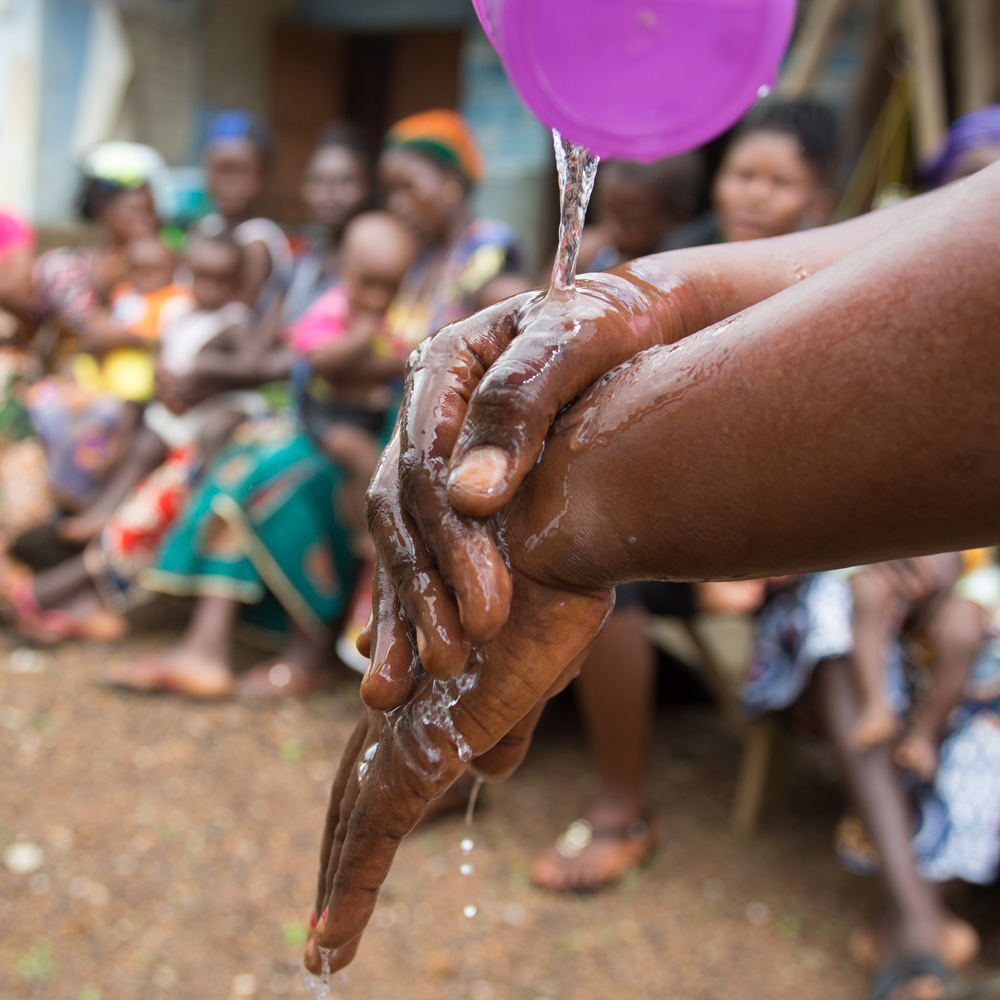
My e-envelope message – I’m posting this here because it includes the figures I quoted in my sermon which you may want to use in your e-envelope message.
Dear Friends
This is Christian Aid week. Normally we would be collecting house to house, but the Covid-19 epidemic makes this impossible. The epidemic also however makes it even more important that people have access to soap, clean water and sanitary facilities. At least 10% of the world’s population doesnt have access to safe drinking water. One in 4 don’t have a toilet, and 673 million people have to defecate in the open. Not surprisingly this leads to a lot of illness, apart from Covid19. The latest figures from 2017 tell us that more than half a million children in the world under 5 die each year from diarrhoea. That’s more in one month, every month than those of all ages who have died in the UK from coronavirus. The death rate in children under 5 from diarrhoea is 100 times that in developed countries including the UK.
There are three ways in which you can help:
Make a donation yourself:
https://www.justgiving.com/fundraising/ststephenschristianaid2020
forward this email to others and encourage them to donate
sponsor me in my “knitathon”. (details below)
A Novice Knitathon
I only learnt to knit last November so I’ll be knitting a scarf (it’s the only thing I can knit!) and asking to be sponsored for every inch I knit during Christian Aid week. To give you some idea what to expect the four foot scarves I’ve knitted for Yvan and for his mother so far have taken me about two months each.
Here is a photo of my casting on so you can see what I plan to knit.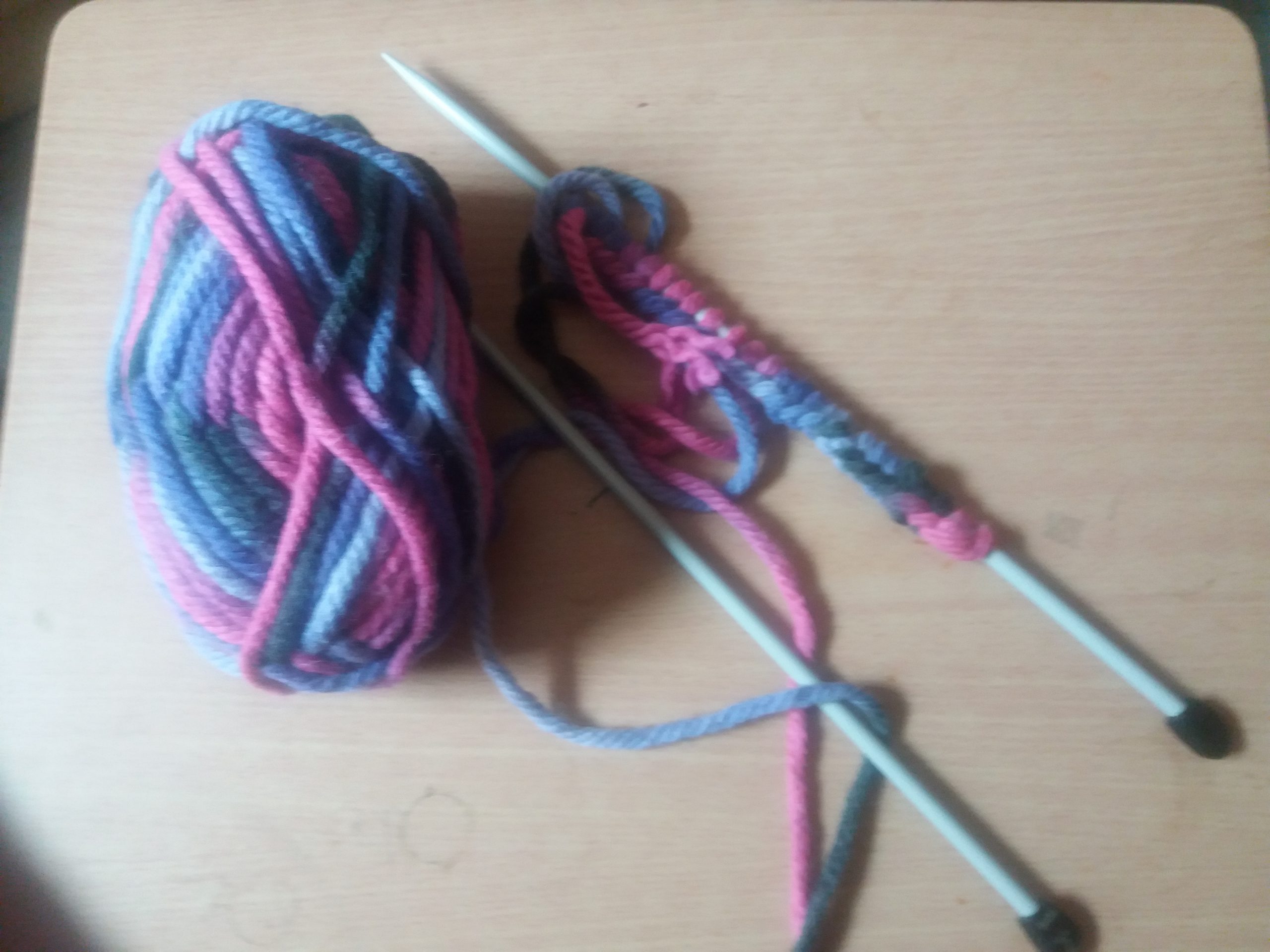
I’ll post a message saying how much I have managed to knit (with photographic evidence) on my blog next Sunday.
You can sponsor me by sending an email, by adding a comment to my Christian Aid blog post or on St Stephn’s Facebook page, or direct to the just-giving page. https://www.justgiving.com/fundraising/ststephenschristianaid2020
When I’ve finished the scarf (probably sometime in the Autumn) it will be given to a charity working with homeless people so it can help keep someone in the UK warm next winter.
Normally this week many of us would be getting ready for our house to house collection of Christian Aid Week. St Stephen’s usually raises around £2000 through this – a significant some for those in poor countries living on a few pounds a week.
This year we cannot do that but instead we have set up a “Just Giving” page https://www.justgiving.com/fundraising/ststephenschristianaid2020 so that all of us, whether we normally collect for Christian Aid or not, can both to make a donation and also encourage our friends and neighbours to contribute.
Some people usually raise money through activities – cake sales, coffee mornings etc. Instead of (or as well as) asking people for donations why not be imaginative and create some online fund raising activities people can take part in? There are ideas and more information on
https://www.christianaid.org.uk/news/coronavirus-guidance-christian-aid-week-events-and-activities
Please help to make sure we don’t let those who rely on Christian Aid down in this year when they too face the problems of Covid-19 but without the NHS and our comfortable houses to help us ride it out. Start planning NOW what you are going to do this week Christian Aid week. Why not post your ideas on the St Stephen’s Facebook page https://www.facebook.com/ststephenscanterbury/ ?
Like a lot of people, I am using some of my lockdown time to sort out things in the house. Actually I had already decided to do that because my mother died last autumn, and making room for the stuff from her home we didnt want to give away or sell meant some de-cluttering was necessary in any case. But the peace of social distancing has encouraged me to go further with this than I otherwise might have done.
My bookshelves are full of books which I bought and never got round to reading, or read long ago and have forgotten about. One of the great pleasures of enclosure has been finding and reading or rereading some of these:
Sara Maitland’s book of stories inspired by the Stations of the Cross in St John’s Bethnal Green. I read Simon of Cyrene in my Passiontide meditation, but the others too are well written, and several moved me to tears. The story of Veronica is also deeply moving – it emerges she was the woman whose haemorrhage was cured by touching the hem of the garment Jesus was wearing, and so wiping his face was a small repayment for her healing. That will defintely come out next Lent.
A book written by a patient of mine twenty-five years ago when I was in London; I probably read it at the time but had forgotten all about it. I reread it and found it was a well written, thoughtful fairytale which like Tolkien or the Narnia stories tells great truths about the nature and purpose of life. I found the email address of the author on the web and got back in touch with her, to our mutual delight.
I found and re-read “The Hound and the Falcon” – a strange but fascinating set of letters by Antonia White, written during her return to faith in the early days of World War II. Some people have compared the current crisis to those times, but reading a contemporary account makes it clear it was very different and much, much more terrible – not least because it was unleashed deliberately by human beings on each other.
A E Housman’s “A Shropshire lad” was lodged between two scores in my printed music collection. How it got there I cannot imagine but finding it again I cant resist sharing one of my favourite poems in it:
Loveliest of trees, the cherry now
Is hung with bloom along the bough,
And stands about the woodland ride
Wearing white for Eastertide.
Now, of my threescore years and ten,
Twenty will not come again,
And take from seventy springs a score,
It only leaves me fifty more.
And since to look at things in bloom
Fifty springs are little room,
About the woodlands I will go
To see the cherry hung with snow.
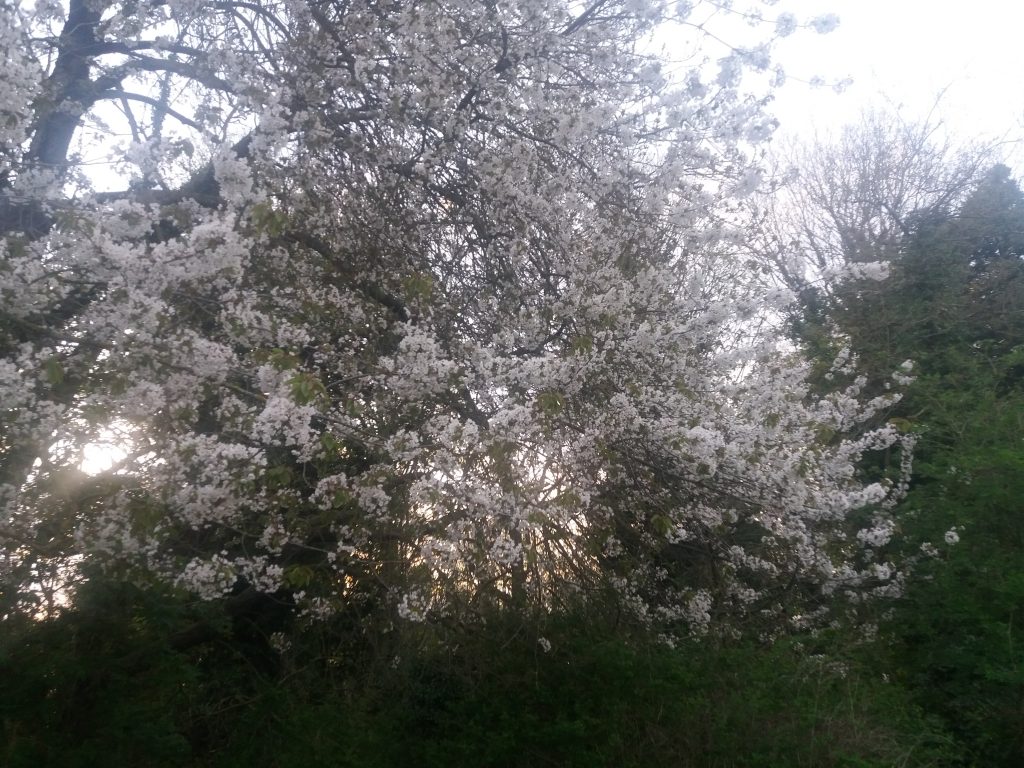
Sorting out the CD’s has produced some finds too; Dvorak’s Mass in D I sang on a tour in Avignon twenty years ago – a lovely and underperformed piece. Underperformed too are the Bach Cantata’s which we bought as part of a very cheap box of his collected works some years ago. There are over 200 and many of them contain music as fine as in the Passions and the Christmas Oratorio which we hear regularly. I’ve printed off a list and hope to listen to them all in time, though we will probably have a vaccine for Covid 19 before I have finished them.
Not everything is worth keeping; the garage is slowly filling with boxes to go to the charity shops when they reopen. But I amrealising that by having fewer books, less stuff in general, it is easier to see and appreciate what I do have and to use it properly. Perhaps a metaphor for life in general.
This morning I found a book of French poetry which includes this gem I had never read before, by Marcelene Desbordes- Valmore whom I had never heard of:
‘irai, j’irai porter ma couronne effeuillée
Au jardin de mon père où revit toute fleur ;
J’y répandrai longtemps mon âme agenouillée :
Mon père a des secrets pour vaincre la douleur.
J’irai, j’irai lui dire au moins avec mes larmes :
” Regardez, j’ai souffert… ” Il me regardera,
Et sous mes jours changés, sous mes pâleurs sans charmes,
Parce qu’il est mon père, il me reconnaîtra.
Il dira: ” C’est donc vous, chère âme désolée ;
La terre manque-t-elle à vos pas égarés ?
Chère âme, je suis Dieu : ne soyez plus troublée ;
Voici votre maison, voici mon coeur, entrez ! “
Ô clémence! Ô douceur! Ô saint refuge ! Ô Père !
Votre enfant qui pleurait, vous l’avez entendu !
Je vous obtiens déjà, puisque je vous espère
Et que vous possédez tout ce que j’ai perdu.
Vous ne rejetez pas la fleur qui n’est plus belle ;
Ce crime de la terre au ciel est pardonné.
Vous ne maudirez pas votre enfant infidèle,
Non d’avoir rien vendu, mais d’avoir tout donné.
Very comforting for someone who often feels like a flower that is no longer beautiful.